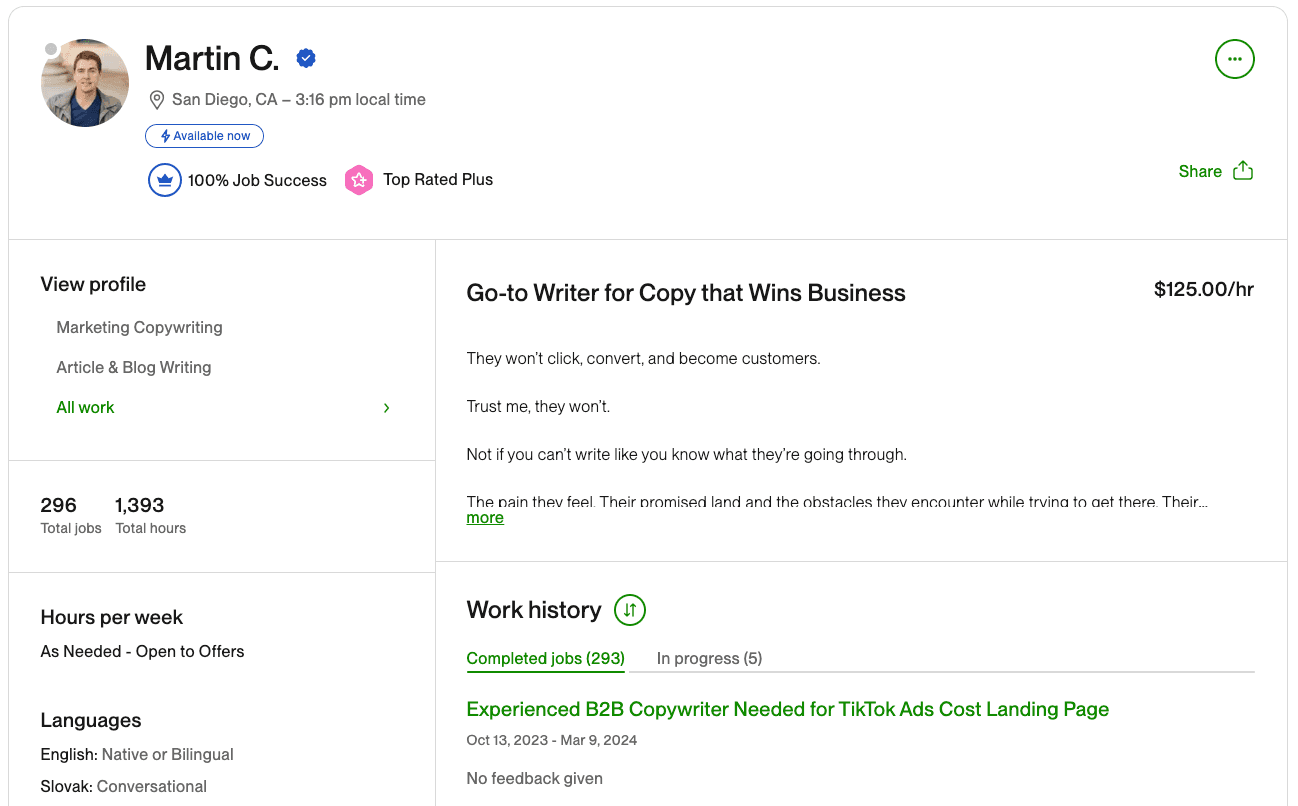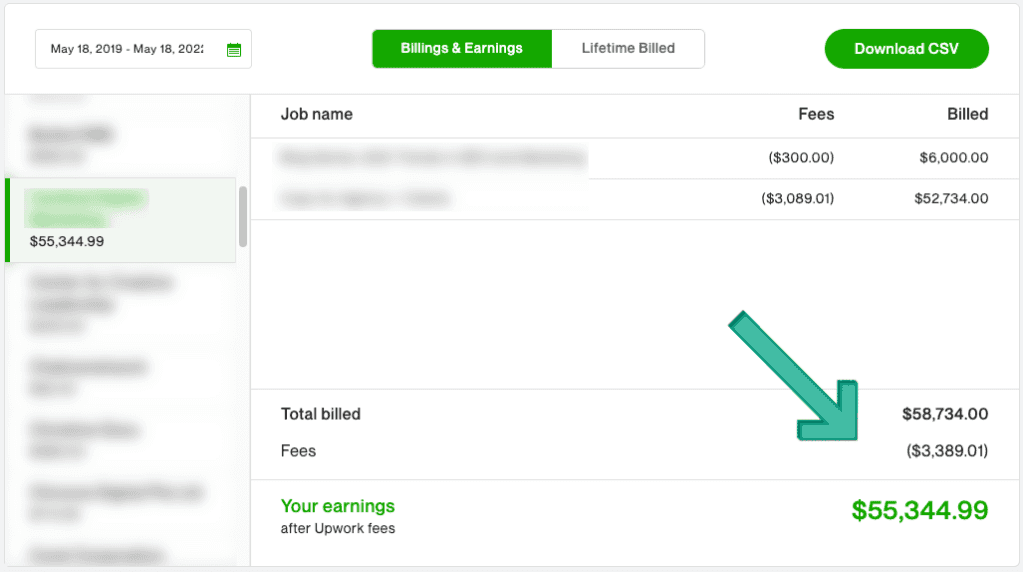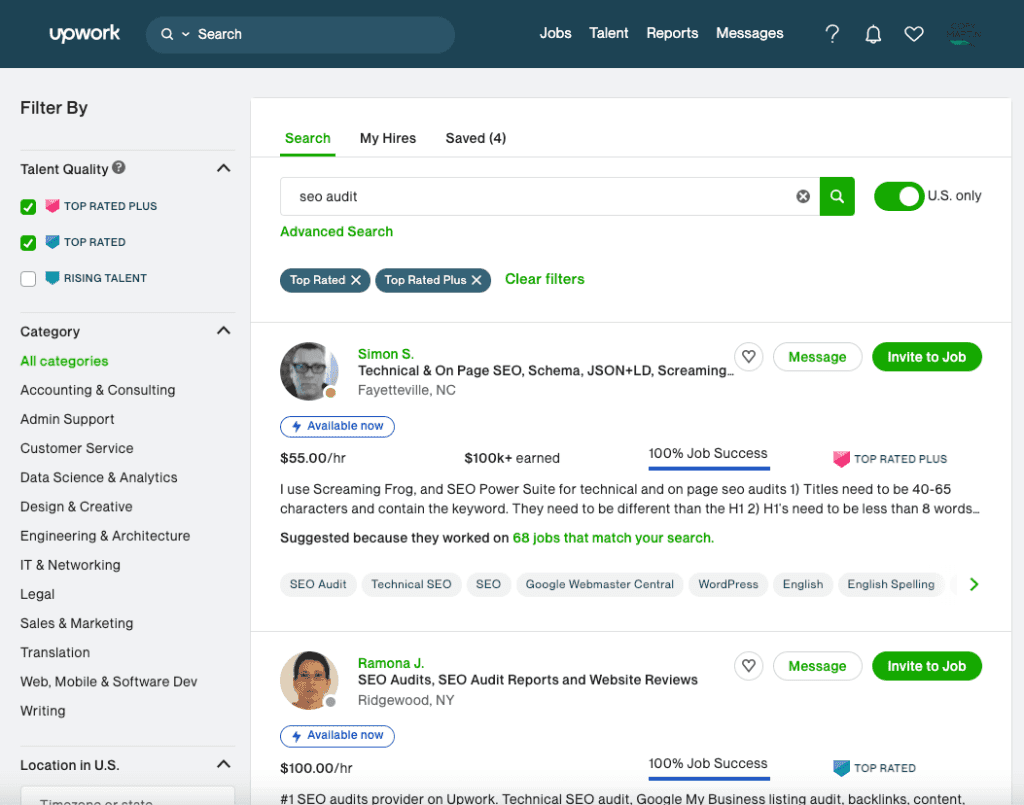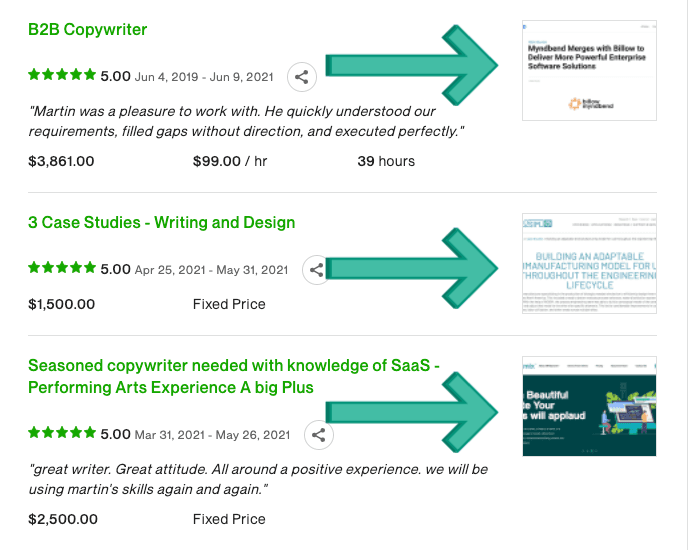Upwork is a contentious subject among freelancers. For every proponent of the platform, there’s three freelancers who think it’s an absolute blight. Nevertheless, I’ve earned good money as a freelance content writer on Upwork. If you’re one of the many people wondering how to become a successful freelancer on Upwork, I’d like to share some of what I’ve learned so far.
Right for me, but is Upwork right for you?
Before continuing, I want to be clear about a few things. I’m not here to sell you some course on how to make money on Upwork (mostly because I don’t think you need a course for that). I’m not affiliated with Upwork in any way, other than the fact that I’m a freelancer and client who works and hires on the platform. Which is all to say that if you never touch the platform, or hate it with a passion, no worries.
This post probably isn’t for you.
Since I first joined Upwork around 2016, I’ve earned more than $200,000 on the platform. I have a 100% Job Success Score across 296 completed jobs, which has helped me achieve Expert Vetted status.
Here’s what my Upwork profile looks like:
Your heading comes here
Start describing your topic in a few words. Make sure to stay concise and include important keywords. Don't be afraid to write shorter sentences. It's common to think that longer sentences sound smarter or more eloquent but in reality, they just make your story harder to follow and understand — just like this one.
3. There are bad listings, flaky people, and scams
There’s all kinds of clients on Upwork and they’re not all reliable.
For example, I’ve had multiple clients go radio-silent after I delivered my first draft. No feedback. No formal close to the contract. Just gone without recompense.
Since then, I’ve learned to never proceed with work unless I receive not only a job offer, but a funded and active milestone. That way, I’m covered under the Upwork Payment Protection guidelines and will likely be paid even if a client ghosts me.
Warning signs of a bad Upwork client
Job listing/invitation includes typos
Asks to communicate via text/WhatsApp/Skype/Telegram
Doesn’t have a profile photo or work history
Has poor ratings from other freelancers
Asks for free work in exchange for exposure
Asks for free “trial” work
Asks you to buy a product in order to do the job
Wants something unethical (writing another student’s paper for them, for example)
Hunting for a bargain
Acts like a jackass
One more thing. I see a lot of people on forums, communities, and social media screenshotting all of the laughably bad jobs they come across on Upwork. That’s their prerogative. All I can say is it takes far less time to ignore a post, or decline a job invite, and move on to the next opportunity.
4. Confident communication and pricing reduces problems
You’ll mostly interact with clients through the built-in messaging feature, which now includes the ability to conduct calls and video chats, or record Loom videos. Take it from me: you can avoid so many problems if you communicate and price your projects with confidence.
Think about it: a lot of clients have never hired on Upwork, hired for your specific services, or both. Beyond your actual skill (writing, graphic design, etc.), learn how to guide prospective clients through a project. What steps will you take? What will the project timeline look like? And what is your fee? Have your answers ready, because they’ll come up during your initial communications.
The quality of your answers might win you the job.
This means asking the right questions of the client, too. What format is the deliverable? When do you expect to see the next draft? Get all the information you need so that there are no surprises.
Lastly, a note on pricing. I always bid on Upwork projects based on my rates, no matter what the client lists as their project price. If they want to pay my rate, wonderful—we’ll be on the same page and I’ll be fairly compensated for all the “stuff” that goes into that website copy, blog post, or case study. If not, I consider it a bullet dodged, politely decline, and move on.
5. Your Upwork profile is very important
I’m active on the Upwork Professional Group on LinkedIn. Almost daily, someone asks why they’re not seeing any traction. The first thing I do is look at their profile. Nearly 100% of the time, those struggling freelancers have incomplete, poorly written, or thin Upwork profiles.
Similar to LinkedIn, Upwork runs on an algorithm.
That algorithm figures out how to rank freelancers’ profiles and job listings for the many people searching Upwork every day. As a freelancer, much of your algorithmic juice comes from your profile. And you want a lot of algorithmic juice, because it’s crowded out there!
Here’s what it looks like on my end when I search Upwork for a freelancer:
Start describing your topic in a few words. Make sure to stay concise and include important keywords. Don't be afraid to write shorter sentences. It's common to think that longer sentences sound smarter or more eloquent but in reality, they just make your story harder to follow and understand — just like this one.
6. Poor feedback will cost you
JSS is a big deal. As you complete jobs, this score changes based on metrics like client feedback, jobs completed vs. jobs abandoned, etc. The idea is to keep this number above 90%, as it appears prominently on your profile.
What’s more, your JSS and client approval rating shine big and bright (or dark and ominous) on your Upwork profile. Clients can filter their searches based on JSS thresholds. Cancelled jobs, negative feedback, poor ratings, or jobs with no ratings can all degrade your JSS.
If you take exception with the way Upwork weighs client feedback, I feel you. The onus falls heavily on the freelancers. For example, I was a Top Rated freelancer with a 94% JSS when my score unexpectedly dipped below 90%. Business flagged and I had trouble winning clients.
My eyelid started twitching.
On face value, my Upwork profile was in order. No bad feedback. Nothing I could point to that created the spike. When I followed up with Upwork support, they threw their hands up. What I later found out is that clients leave both public and private feedback at the close of a job. The client can smile to your face and leave bad private feedback, which ultimately hurts your JSS.
Yes, you can dispute bad jobs. If the dispute is valid, Upwork will review it and in some cases make things right. But they won’t adjust profile ratings and they’ll do little to help freelancers recover from a dip in their JSS. The client, unless Upwork is its only source of freelance work, are none the worse for wear. They can just dip out and find their freelance work elsewhere.
This was probably the closest I came to turning in my card and joining the others howling scam on LinkedIn and Twitter. Instead, I got back on my chestnut and slowly rebuilt my score. I did the very same thing I would do to recover from a bad client experience out in non-Upworklandia.
Your heading comes here
Start describing your topic in a few words. Make sure to stay concise and include important keywords. Don't be afraid to write shorter sentences. It's common to think that longer sentences sound smarter or more eloquent but in reality, they just make your story harder to follow and understand — just like this one.
Your heading comes here
Start describing your topic in a few words. Make sure to stay concise and include important keywords. Don't be afraid to write shorter sentences. It's common to think that longer sentences sound smarter or more eloquent but in reality, they just make your story harder to follow and understand — just like this one.
Your heading comes here
Start describing your topic in a few words. Make sure to stay concise and include important keywords. Don't be afraid to write shorter sentences. It's common to think that longer sentences sound smarter or more eloquent but in reality, they just make your story harder to follow and understand — just like this one.





